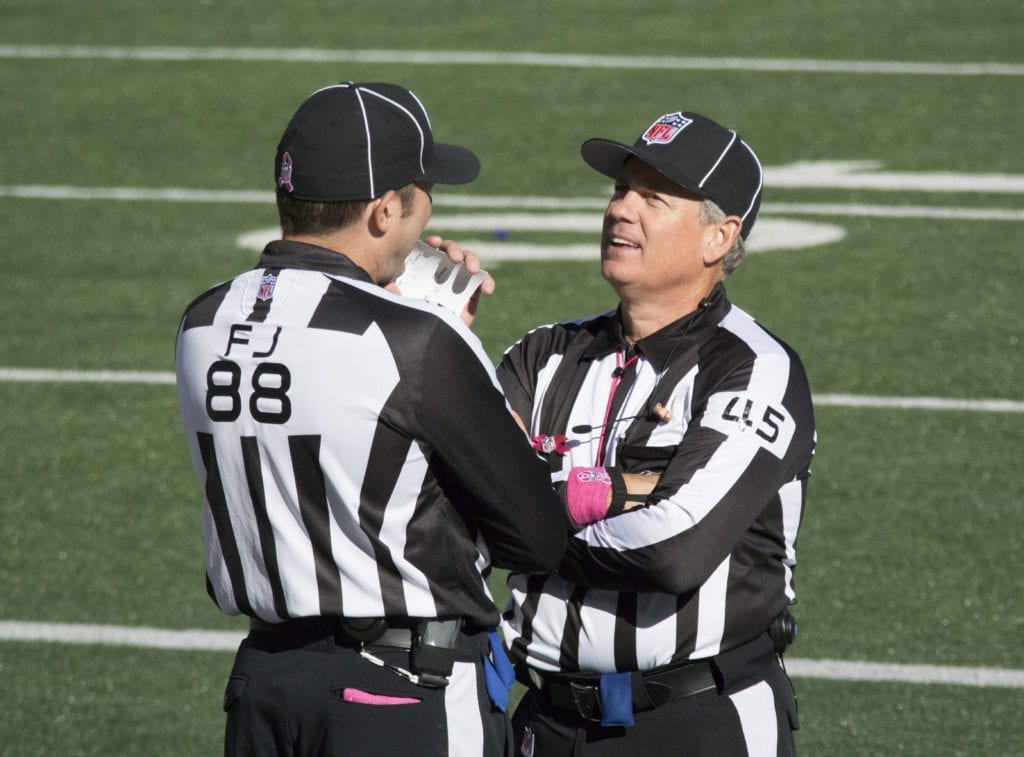Super Bowl LI just another example that NFL’s overtime needs changing
NFL MVP Matt Ryan walked off the field after his overtime loss in the Super Bowl without getting a chance to touch the ball once, and that’s a problem.

NFL officials converge over a call during a game between the Atlanta Falcons and the Baltimore Ravens in Baltimore on Oct. 19, 2014. Photo obtained via creativecommons.org, no changes made.
Super Bowl LI began with the hype of two of the best signal-callers in the game facing off and ended with one leading a game-winning touchdown drive.
It lived up to the hype. We saw this year’s NFL season MVP Matt Ryan put together a near-flawless first half. We rubbed our eyes as Tom Brady led four consecutive scoring drives to end regulation in the most improbable tie in recent memory. Then, the now-five time Super Bowl winner opened overtime by leading the Patriots down the field to a walk-off touchdown to cap off the greatest comeback in Super Bowl history.
But we deserved more.
We deserved to see Ryan, who had the best season of his career, get a chance at redemption. It’s a shame that he and NFL Assistant Coach of the Year Kyle Shanahan watched New England running back James White barrel into the end zone in overtime without getting one chance to touch the ball.
Did the Falcons deserve more chances to win the Super Bowl? Probably not. New England shifted focus at halftime to stop the Atlanta’s ground game while the Falcons abandoned their own, letting Brady drag the Patriots back into contention.
The Patriots were the better team in the second half and dominated time of possession. Atlanta’s defense was on the field for 93 plays, double the 46 plays that the Patriots’ defense was on the field. If Atlanta had tied things up, an already-gassed defense would have been tasked with stopping the greatest quarterback of our generation after he had already found so much success.
But none of that matters.
Matt Ryan and the Falcons deserved to have a chance in overtime because it’s simply stupid to put a team in such a backs-against-the-wall position because it lost a coin toss.
No other sport does it.
The NFL’s closest counterpart, college football, gives each team a fair chance. Both teams start with first-and-10 from the opponent’s 25-yard line with a chance to get a first down or score. While it’s obviously easier to score from 25 yards out then 75 yards (assuming the first NFL overtime possession begins with a touchback on the kickoff), a score doesn’t end the game.
In college football, the team who plays defense first gets a fair chance. If that team ties the game when it switches to offense, overtime goes on. If the team can score more points on that possession than its counterpart did, the game ends. But, it’s a fair chance for both teams.
It makes sense when looking at a sport that considers possessions differently than football does, too. Soccer’s overtime rules take a similar “fair chance” stance. A standard international game of professional soccer is 90 minutes of game time. Overtime rules usually dictate two halves that are 15 minutes a piece, resulting in 30 extra minutes of time for a team to separate itself from the other.
Soccer is similar to football in a many ways, but one of the biggest differences between the two is possession. While football stops play after a change of possession, soccer doesn’t. Football teams usually have completely different personnel for when their offense or defense is on the field. While 11 men are allowed on the field at a time, those 11 men almost always change if the teams change possession.
That isn’t the case with soccer. Although most professional teams have three or so substitution options during a match, the same 11 people are on the pitch regardless of which team has possession of the ball. Because of this, it’s harder for a team to control possession for a long period of time, and it’s even more rare for those possessions to end in a goal.
When a goal does come in extra time, though, the game doesn’t end. The scoring team has to hold that lead until the end of the 30-minute extra period.
If the match is still tied at the end of the extra time, most games go to a shootout. This is more similar to NFL overtimes — each team alternates with a player who tries to score a goal on an opposing goalie. Each team has five shots to separate itself from the other. Again, a fair chance.
Look at baseball. Major League Baseball’s overtime rules are similar to college football’s overtime rules. From the 10th inning on, the away team bats in the top of the inning with a chance to take the lead. Then, in the bottom of the inning, the home team can win the game by scoring the go-ahead run. It’s a walk-off win, but both teams get a chance to score each inning, just like in the regular nine innings.
Adapting the NFL’s overtime rules to the MLB would look something like this: both teams flip a coin, with the winner of the coin toss getting to choose whether to bat first or field first. However, if the team chooses to bat first, it can win the game in walk-off fashion by hitting a homerun. The other team wouldn’t even get to bat.
Seem ridiculous?
The list of overtime examples from other sports that differ from the NFL’s rules goes on. Basketball is harder to compare to football as a sport, but it offers an extra timed period similar to soccer’s extra time that allows each team multiple possessions to prove that it deserves to win.
Should the NFL adopt another 15-minute quarter for overtime? Maybe. Games are about as long as they need to be already, though, and another 15-minute quarter could stretch television games into the four-hour mark.
What about an 8-minute period? It’s shorter, but should offer both teams a chance to possess the ball at least once. Although 8-minute drives are rare in football, they aren’t impossible. Some teams could try to hold the ball for close to the full extra quarter and score with little or no time remaining. Then, we’re back to square one.
There isn’t really a set answer for what needs to change, but the NFL’s overtime rules need change. It’s the only sport in the world that can tell a team it has the best player in the league and then deny that player a chance to touch the ball in overtime while watching his team lose.
And we deserve more than that.
Edited by David Bradford
Featured image by Keith Allison
Nathan is a junior at the University of Tennessee-Knoxville. He spends most of his free time eating meaningless foods and watching sports. If you wish to contact Nathan, you can email him at wodom3@vols.utk.edu or find him on Twitter, @NathanOdom11.



